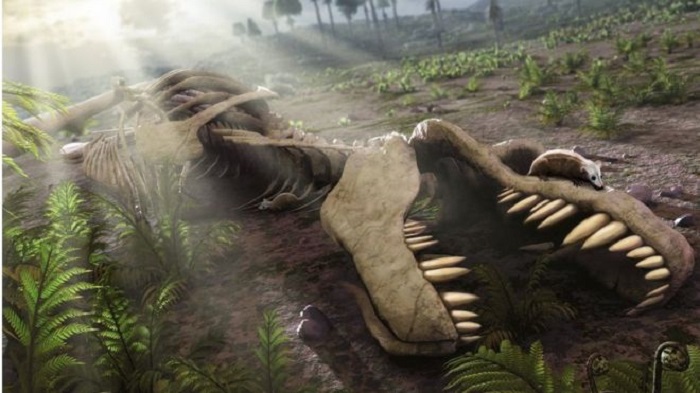A team suggests the creatures were in long-term decline because they could not cope with the ways Earth was changing.
The study appears in PNAS journal.
Researchers analysed the fossil remains of dinosaurs from the point they emerged 231 million years ago up to the point they went extinct.
To begin with, new species evolved at an explosive rate. But things started to slow about 160 million years ago, leading to a decline in the number of species which commences at about 120 million years ago.
Dr Manabu Sakamoto, a palaeontologist from the University of Reading, who led the research, said: "We were not expecting this result."
"Even though they were wiped out ultimately by the impact of the asteroid, they were actually already on their way out around 50 million years before the asteroid hit."
Mixed pattern
Dr Sakamoto`s analysis shows that the long-necked giant sauropod dinosaurs were declining the fastest, whereas theropods, the group of dinosaurs that included the iconic Tyrannosaurus rex, were in a more gradual decline.
Co-author Dr Chris Venditti, an evolutionary biologist from the University of Reading, told BBC News:
"The current widespread view is that dinosaurs were reigning strong right up to the impact that hit the Earth - and it`s the impact that drove their final extinction," he said.
"And while that`s certainly true, what we found was that they were on the decline long before that."
Dr Venditti believes that the dinosaurs` 50 million year decline rendered them even more susceptible to the environmental catastrophe that followed the asteroid impact.
"If they were reigning strong perhaps they would have fared much better than they did," he said.
A study two years ago also indicated that some species were in decline, but only for the last few million years before the asteroid impact. The new research suggests that the problem began tens of millions of years earlier and affected a wider range of species.
So why were the dinosaurs in decline? No one knows but one possibility is an inability to cope with the way the environment was changing.
Evolutionary pressures
Conditions 230 million years ago were perfect for the dinosaurs when they first emerged, warm and lush from pole to equator.
But as the climate cooled and sea levels shifted, the dinosaurs may have been subjected to new evolutionary pressures.
Dinosaurs and mammals evolved at about the same time, but the former dominated the land surface for more than 100 million years.
The asteroid impact is commonly thought to have paved the way for mammals to take over. But the new study suggests that mammalian supremacy might have occurred eventually, without a space impact.
Co-author Prof Mike Benton of Bristol University, told BBC News: "World climates were getting cooler all the time. Dinosaurs rely on quite warm climates and mammals are better adapted to the cold.
"So there might have been a switch over in any case without the asteroid impact."
More about:
















































